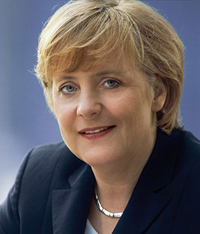Merkel and Royal meet in all-woman test of clashing styles and politics
Angela Merkel made minimal to-do about her gender as she climbed to Germany's helm, becoming its first woman chancellor. Across the Rhine, Segolene Royal has put the fact she is a woman at the forefront of her campaign for France's top job.

Their first meeting Tuesday will spotlight starkly different styles and political differences, which could have consequences for Europe's future. And their success suggests that Europe's women leaders have come a long way since the days of Margaret Thatcher, whose flinty style as Britain's Iron Lady was a reflection of just how male-dominated her world was.
"We are getting used to the idea of women politicians," said Noelle Lenoir, a former French minister for European affairs who now heads the European Institute at French business school HEC. At Tuesday's meeting, she said, "image is very important, but not more important than politics."
Royal faces a tough and tight race against conservative Nicolas Sarkozy in elections in April and May, after her swift and stunning climb to the Socialist Party nomination. She has banked on a thirst for fresh faces in a largely stagnating nation.
Royal cultivates a glamour-mom image, favoring light and bright colors and saying she makes political decisions based on what she would do for her four kids. She isn't married to her partner of three decades and speaks emotionally about families and women's rights, but has often blundered on foreign affairs.
In contrast, Merkel is a methodical former physicist with no children, a conservative wardrobe, a husband who ducks the limelight, and a reputation as a backroom dealmaker.
Politically, the two differ on how to rescue European planemaker Airbus, the role of the European Central Bank, and how to revitalize their economies, the largest in the euro-zone. Broadly, the center-right Merkel wants less state involvement, while Socialist Royal wants more.
Their most obvious similarity is their gender, but Royal's entourage is not playing this up ahead of Tuesday's talks. Royal, who requested the meeting, stressed in an interview with Le Monde released Monday that she wants to "listen to (Merkel's) point of view."
The two women are both in their early 50s, as is Sarkozy meaning that in two months, both France and Germany will likely be led by people born after World War II for the first time, reports AP.
Merkel's and Royal's careers carry some parallels. Merkel was minister of women and youth and later environment minister in the 1990s. Royal served as environment minister and later minister for schools and families.
Subscribe to Pravda.Ru Telegram channel, Facebook, RSS!




